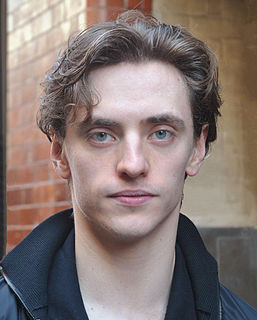A Quote by Neal Stephenson
The GPS unit became almost equally obstreperous, though, over Richard’s unauthorized route change, until they finally passed over some invisible cybernetic watershed between two possible ways of getting to their destination, and it changed its fickle little mind and began calmly telling him which way to proceed as if this had been its idea all along.
Related Quotes
Or perhaps a widow found him and took him in: brought him an easy chair, changed his sweater every morning, shaved his face until the hair stopped growing, took him faithfully to bed with her every night, whispered sweet nothings into what was left of his ear, laughed with him over black coffee, cried with him over yellowing pictures, talked greenly about having kids of her own, began to miss him before she became sick, left him everything in her will, thought of only him as she died, always knew he was fiction but believed in him anyway.
Neighborhoods built up all at once change little physically over the years as a rule...[Residents] regret that the neighborhood has changed. Yet the fact is, physically it has changed remarkably little. People's feelings about it, rather, have changed. The neighborhood shows a strange inability to update itself, enliven itself, repair itself, or to be sought after, out of choice, by a new generation. It is dead. Actually it was dead from birth, but nobody noticed this much until the corpse began to smell.
Publicity is the only thing some people fear. An aroused public opinion has been the cause of most reforms. Telling the truth is perhaps the pacifist's only weapon. Over and over again, even the suggestion that one may publish the facts has changed a scornful, bullying opponent into an almost subservient helper. But how dangerous it is!
I saw what I had been fighting for: It was for me, a scared child, who had run away a long time ago to what I had imagined was a safer place. And hiding in this place, behind my invisible barriers, I knew what lay on the other side: Her side attacks. Her secret weapons. Her uncanny ability to find my weakest spots. But in the brief instant that I had peered over the barriers I could finally see what was finally there: an old woman, a wok for her armor, a knitting needle for her sword, getting a little crabby as she waited patiently for her daughter to invite her in.
About what mainly constituted what you ask, it was something other. It was just a certain inclination to meet people. And as far as possible, to change something in the other, but also to let me be changed by him. At any event, I had no resistance, I put no resistance to it. I already began as a young man. I felt I have not the right to want to change another if I am not open to be changed by him as far as it is legitimate.
I wanted to start over completely, to begin again as new people with nothing of the past left over. I wanted to run away from who we had been seen to be, who we had been... It's the first thing I think of when trouble comes - the geographic solution. Change your name, leave town, disappear, make yourself over. What hides behind that impulse is the conviction that the life you have lived, the person you are, is valueless, better off abandoned, that running away is easier than trying to change things, that change itself is not possible.
I certainly felt I had an idea of World War II, and it's probably the idea that many people share: there was this insane aggressor, and there was really only one way to proceed in resisting him. What I didn't realize is that there were many voices belonging to reasonable, interesting, complicated people who had a different way of interpreting the possible responses to the Hitlerian menace.
All of a sudden I became aware of a little star in one of those patches and I began looking at it intently. That was because the little star gave me an idea: I made up my mind to kill myself that night. I had made up my mind to kill myself already two months before and, poor as I am, I bought myself an excellent revolver and loaded it the same day. But two months had elapsed and it was still lying in the drawer. I was so utterly indifferent to everything that I was anxious to wait for the moment when I would not be so indifferent and then kill myself. Why -- I don't know.
Thus, after a period of about two thousand years the greatest crime became to worship a god other than the God of Moses, whereas injustice became a minor sin. I began to ask myself how this change had come about. Was it linked to a new order in which the female goddesses had been replaced by one male god?
The maiden Olympics had more to protest about than mere war, though. Central to its ethos was a rejection of two establishments the political one, certainly, but also that of the wider poetry world itself. It changed poetry for ever in the UK, ... It led to readings all over the country. You suddenly got more women reading and publishing poems, as well as gay guys and poets from all over the world. Until that time, published poetry had been very university-based white, male, middle-class. We were trying to break poetry out of its academic confines.






































